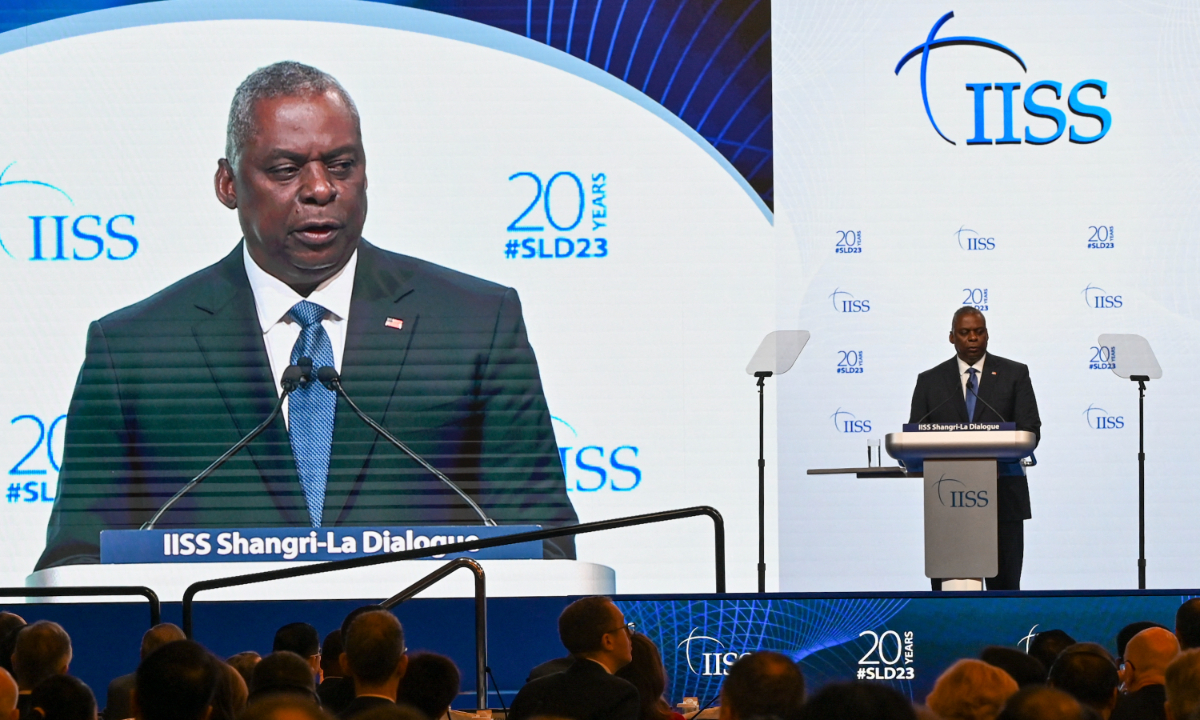Impossible to push China-US military ties at US pace: Chinese expert on US defense chief’s speech on Shangri-La Dialogue

US Secretary of Defense Lloyd Austin speaks during the 20th Shangri-La Dialogue summit in Singapore on June 3, 2023. Photo:AFP
It is impossible for China-US military ties to move forward according to the pace set by the US, under the circumstances that US completely disregards some basic requirements set forward by China regarding the latter's core interests and major security concerns, a Chinese military expert told Global Times on Saturday when commenting on US Secretary of Defense Lloyd Austin's keynote speech at the IISS Shangri-La Dialogue, delivered earlier today.
Austin began his speech by emphasizing US alliance with Asia-Pacific countries. "We have forged new friendships and deepened old alliances," he said. "We're stepping up planning, coordination, and training with our friends from the East China Sea to the South China Sea to the Indian Ocean. That includes staunch allies such as Australia, Japan, the Republic of Korea, the Philippines, and Thailand. And it includes such valued partners as India, Indonesia, Vietnam, and our hosts here today in Singapore," Austin added.
Austin gave an example that the US will forward station its "12th Marine Littoral Regiment - the most advanced formation in the US Marine Corps - in Japan by 2025 to deepen stability in the First Island Chain."
In terms of US-led multilateral institutions, Austin said that all four Quad partners will participate in Exercise Malabar, which will take place off the coast of Australia for the first time this summer. And in July, Exercise Talisman Saber with Australia will bring together 14 countries.
"It will be the largest iteration ever, with more than 30,000 personnel participating, including a significant contingent from Japan," he announced.
Austin then turned the spears against China, saying "we won't be deterred by dangerous operational behavior at sea or in international airspace," describing recent aircraft interception as "troubling case of aggressive and unprofessional flying by the PRC." He also raised the Taiwan question, saying "the whole world has a stake in maintaining peace and stability in the Taiwan Strait," and "we will continue to categorically oppose unilateral changes to the status quo from either side."
Cao Yanzhong, a research fellow at the Academy of Military Sciences of the Chinese People's Liberation Army (PLA), told the Global Times that US military stance toward China is consistent with the US overall policy of containment in various fields, and this containment policy is even more evident in the military domain.
Experts noticed that the US military claimed Chinese aircraft had conducted unprofessional interceptions, but the fact is that a US reconnaissance plane deliberately encroached into a Chinese training area in East China's Shandong Province to carry out reconnaissance and interference.
Lieutenant General He Lei, former vice president of the Academy of Military Sciences under the PLA, told the Global Times on Saturday that flexing military muscles, conducting close-in reconnaissance and military activities right on China's doorstep and in China's own courtyard is a provocation of Chinese sovereignty and a threat to Chinese territorial security.
Lieutenant General He added that the interception actions taken by Chinese military aircraft are a must to safeguard China's national interests and security. They are the responsibility and mission of Chinese armed forces.
While the US emphasizes that its policy toward Taiwan has not changed and it still adheres to the one-China policy on one hand, it has been increasing its arms sales to Taiwan island on the other. Not to mention that just a few days ago, the US delivered the first batch of FIM-92 Stinger air defense missiles to Taiwan island. It has also assisted the military on the island in conducting joint training.
"These actions indicate that the US has taken a series of increasingly aggressive actions concerning China's most important and core interests and major security concerns," Cao added.
It is not that China is unwilling to develop military relations with the US. On the contrary, China has always advocated establishing a cooperative and stable relationship with the US based on win-win cooperation. However, it is precisely the series of provocative actions by the US that continuously provoke China's bottom line, Cao stressed, noting that under such circumstances, it is impossible to push China-US military ties based on the rhythm set by the US.
Cao believes that if the US has the intention to promote the normal development of military relations with China, it should not unilaterally raise demands toward China. The key lies in how the US responds to China's concerns and takes practical actions to improve bilateral military relations, earnestly responding to China's requirements regarding core interests and major security concerns, rather than just paying lip service and claiming the importance of communication with the Chinese military in a courteous yet insincere fashion.



